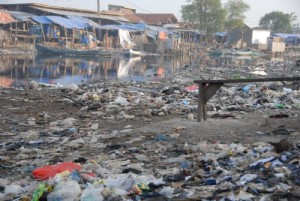
Why is this man smiling?
Like his mother, Ann Dunham Soetoro, the media has sold Barack Obama as a “Leftist”. I don’t believe this story about mother or son. What better camouflage for a corporatist/opportunist/operative than soft focus “Leftist”? While investigating the theory that Obama’s mama, Ann Dunham Soetoro, was a possible CIA covert operative stationed in Indonesia, Thailand and Pakistan, I have been taken in many directions. Most investigative paths led back to Southeast Asia. After a coup and the corporate “opening” of one of the most resource rich countries in the world, Indonesia became one of the poorest-per capita-nations in Asia, with low educational levels and enormous divisions between rich and poor .
Summarizing some of my earlier posts, 

Poor area of Jakarta
I followed the connections between Peter Geithner (long time head of the Ford Foundation’s Asia Division) and Ann Soetero. The Ford Foundation in Asia is widely held to be connected to the U.S. Central Intelligence Agency. Ann Dunham Soetoro worked extensively with the Ford Foundation as well as the U.S.A.I.D. and the World Bank, both considered sometime partners in covert operations. Barack Obama’s step-father, Lolo Soetoro was a high ranking military officer in Suharto’s Army and a government liaison between the Indonesian military government and the international oil industry.
Peter Geithner’s son Tim, Obama’s Treasury Secretary, was raised primarily in China and Southeast Asia. As Clinton undersecretary for Asian Affairs and high ranking officer in the International Monetary Fund, it was Geithner’s monetary medicine that led to a worsening of the Asian financial catastrophe — which wrecked the economies primarily of Thailand, Indonesia and South Korea. Many experts believe Geithner’s monetary policy led to the crash of the Southeast Asian economies. Other factors in the collapse were overvalued real-estate assets and outside currency manipulations. Foreign capital had been pouring into the Southeast Asian economies, due to high interest rates relative to the dollar. When American interest rates began to rise, capital flowed toward American investments, out of Asia. Thailand was forced to “float” its currency against the dollar. This resulted in the crash of the value of the Asian currencies and a deep retrenchment of real estate values. The financial collapse called for a massive infusion of IMF funds.
Does this scenario sound familiar to you?
The foreign ministers of the 10 ASEAN countries believed that the well co-ordinated manipulation of their currencies was a deliberate attempt to destabilize the ASEAN economies. Former Malaysian Prime Minister Mahathir Mohamad accused George Soros of ruining Malaysia’s economy with “massive currency speculation.”
The economic crisis also led to a political upheaval, most notably culminating in the resignations of President Suharto in Indonesia and Prime Minister General Chavalit Yongchaiyudh in Thailand. There was a general rise in anti-Western sentiment, with George Soros and the IMF in particular singled out as targets of criticisms.
George Soros
Soros is also reviled in some quarters for his speculative manipulation shorting of the British Pound Sterling. The British government fought back with massive central bank intervention but was unable to defend its currency which lost 20% of its value. With this attack, Soros made (I won’t say earned) more than 1.1 billion dollars in a single day.
Soros doesn’t just anticipate currency devaluations, his hedge fund movements and his dire warnings often cause the events.
From Wikipedia:
When investment regulations restricted his ability to run the funds as he wished, he quit his position in 1973 and established a private investment company that eventually evolved into the Quantum Fund.
Soros is also a former member of the Carlyle Group. Recall that the Carlyle Group’s members include former defense department and CIA heads as well as members of the Saudi royal family.
According to Wikipedia this is the focus of the Carlyle Group’s financial interests:
Carlyle invests primarily in the following industries: aerospace and defense, automotive, consumer and retail, energy and power, health care, real estate, technology and business services, telecommunications and media, and transportation. The Carlyle Group’s investments are focused on East Asia, Europe and North America, with most investment money coming from the United States (65%), Europe (25%), Asia (6%), Latin America, and the Middle East. Defense investments represent about 1% of the group’s current portfolio; for example, Carlyle owns 33.8% of QinetiQ, the recently privatized British defense contractor.
Hmmm…CFR’s interests, healthcare, automotive, electric power,real estate, all Obama’s primary interests in the Economic stimulus package. And…
Interesting that Britain is also privatizing ITS military.
According to Wikipedia:
In late 2006, Soros bought about 2 million shares of Halliburton.
With this information on the table, tell me, do you think Obama is going to end the war? Or will he continue to fill the coffers of Halliburton?
From Chinadaily BBS
Soros likes to portray himself as an outsider, an independent-minded Hungarian emigre and philosopher-pundit who stands detached from the US military-industrial complex. But take a look at the board members of the NGOs he organises and finances. At Human Rights Watch, for example, there is Morton Abramowitz, US assistant secretary of state for intelligence and research from 1985-89, and now a fellow at the interventionist Council on Foreign Relations; ex-ambassador Warren Zimmerman (whose spell in Yugoslavia coincided with the break-up of that country); and Paul Goble, director of communications at the CIA-created Radio Free Europe/Radio Liberty (which Soros also funds). Soros’s International Crisis Group boasts such “independent” luminaries as the former national security advisers Zbigniew Brzezinski and Richard Allen, as well as General Wesley Clark, once Nato supreme allied commander for Europe. The group’s vice-chairman is the former congressman Stephen Solarz, once described as “the Israel lobby’s chief legislative tactician on Capitol Hill” and a signatory, along with the likes of Richard Perle and Paul Wolfowitz, to a notorious letter to President Clinton in 1998 calling for a “comprehensive political and military strategy for bringing down Saddam and his regime”.
George Soros was Barack Obama’s primary, early deep-pocket supporter through MoveOn.Org. Is Soros a conventional “Leftist” or an opportunist who exploits the gaps caused by social transition and political instability? My guess is that he’s the same type of “Leftist” as Obama.
Soros has also speculated that an international reserve currency will replace the dollar
China recently proposed greater use of Special Drawing Rights, possibly as an eventual global reserve currency. “In the long run, having an international accounting unit rather than the dollar may, in fact, be to our advantage …
Where is the “advantage” for the average American citizen?
So, Soros backed Obama. Then, Obama has chosen Tim Geithner (architect of the IMF collapse of the Indonesian and Thai economies) to rescue America from the financial collapse created by unregulated banks and hedge funds. Seems to me like a cluster fuck of the American taxpayer.
Soros and Geithner have something else in common. Both are members of the Council of Foreign Relations, which some believe to be the most influential private foreign policy group in the world. CFR publishes Foreign Affairs. It’s policy think tank is the Rockefeller Institute (closely allied with the Ford foundation). According to Wikipedia:
Journalist Joseph Kraft, a former member of both the CFR and the Trilateral Commission, said the Council “comes close to being an organ of what C. Wright Mills has called the Power Elite – a group of men, similar in interest and outlook, shaping events from invulnerable positions behind the scenes.”
Corporate members of the board of CFR
One long term and influential member of the CFR is Henry Kissinger. Timothy Geithner was an associate of Kissinger and Associates from 1986-1989. Since Kissinger’s clients and activities are totally secret, we don’t know what Geithner actually did while with Kissinger and Associates.
the Times then-national security correspondent, Leslie Gelb, reported that the Midland Bank of Britain was also one of the special influence-purchasing clients of Kissinger Associates that paid Treasury Secretary-Designate Geithner and his colleagues “slightly more than $150,000 yearly for varying services.”
The new order is globalization: the sweeping away of national institutions and borders and transitioning to free trade, mobile international labor markets, mobility of capital movement, worldwide corporate structures. Looking at your family and neighbors — how many are affected by NAFTA, immigration, job loss, outsourcing, …?
Is the U.S. just another country to be destabilized in the global leveling process?
In this article the author takes up globalization fostered by interests in both the political Left and the political Right.
In his book, Promoting Polyarchy, William Robinson describes the formation of a new hegemonic bloc that has emerged to lead the process of globalization. This bloc consists of various economic and political forces that have become the dominant sector of the ruling class throughout the developed world. The politics and policies of this ruling bloc are conditioned by the new global structure of accumulation and production. This historic bloc is composed of the transnational corporations and financial institutions, supranational economic planning agencies, major forces in the dominant political parties, media conglomerates, and technocratic elites in the Third World.
The new integrated circuits of world production and finance are possible because information technologies allow the centralization of decision making along with a geographic decentralization of production. The results are world mobility for investments, markets,and production, which leads globalists to harmonize a wide range of fiscal, monetary and industrial policies across national borders. Therefore, it is the logic of global accumulation, rather than national accumulation, that guides the political and economic behavior of the ruling bloc. (Emphasis mine)
In the U.S., the globalist ruling bloc has three main factions: neo-liberal structuralists; free-market conservatives, and liberal regulationists. Their debates dominate Washington and don’t correspond to the familiar political categories of the industrial era. The same is true of the anti-globalist camp, which contains both the anti-imperialist left and the reactionary populous right.
The globalists consolidated ideologically in the early 1980s under the policy of the Washington Consensus. Developed to deal with the debt crisis in Latin America and Mexico, its main principles were privatization, free trade, high interest rates, and a sharply diminished role for the state in economic activity and social services. This became the policy mantra of the Reagan revolution, and a siren call for the new Democrats. However, the recent Asian crisis has exposed important contradictions and major splits in the globalists camp. Foremost is the question of how best to structure the new world economy, with the debate centered on IMF policies.
Obama’s mama had a cover: a leftist do-gooder. Obama’s acorn didn’t fall far from it’s tree. Left and Right have one goal – weilding power for the accumulation of riches. Left and Right are embodied in one person, and that person is Barack Obama.




 Posted by patriotdems
Posted by patriotdems 
